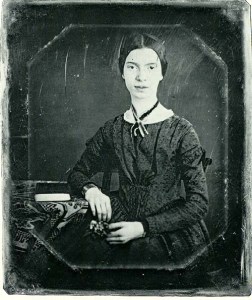On one of Dickinson’s great poems of friendship – analysed by Dr Oliver Tearle
‘I should not dare to leave my friend’ is one of Emily Dickinson’s great poems about friendship. Although she lived her life as a recluse in Amherst, Massachusetts, friendship mattered a great deal to Dickinson, as did family.
In this poem, she revisits one of the perennial themes of her work – death, and the deathbed moments of the dying – but this time, from the perspective of a friend and comforter watching a loved one depart this mortal realm.
I should not dare to leave my friend,
Because—because if he should die
While I was gone—and I—too late—
Should reach the Heart that wanted me—
If I should disappoint the eyes
That hunted—hunted so—to see—
And could not bear to shut until
They ‘noticed’ me—they noticed me—
If I should stab the patient faith
So sure I’d come—so sure I’d come—
It listening—listening—went to sleep—
Telling my tardy name—
My Heart would wish it broke before—
Since breaking then—since breaking then—
Were useless as next morning’s sun—
Where midnight frosts—had lain!
David Sylvian, erstwhile lead singer of the pop group Japan, has set this poem to music, and it lends itself to song  with its use of repetition and its trademark Dickinsonian quatrain structure, echoing the ballad form. What if a loved one who needed your friendship and support spent their dying hours without your help and comfort?
with its use of repetition and its trademark Dickinsonian quatrain structure, echoing the ballad form. What if a loved one who needed your friendship and support spent their dying hours without your help and comfort?
This is the situation Dickinson considers in this poem about the importance of ‘being there’ as a friend. In a letter of 1852, Emily Dickinson had expressed the same sentiment which she here expresses in verses:
I’m afraid I’m growing selfish in my dear home, but I do love it so, and when some pleasant friend invites me to pass a week with her, I look at my father and mother and Vinnie, and all my friends, and I say no – no, cant [sic] leave them, what if they die when I’m gone.’
The language of ‘I should not dare to leave my friend’ is relatively straightforward, with the poem being marked by repetition, making it even more songlike than Dickinson’s poems usually are (and their quatrain form and tetrameter rhythm already make them quite songlike).
But it’s worth noting the double meaning of ‘patient faith’, although it may even be a triple meaning: the dying friend has faith that Dickinson will come before he dies, and so remains patient; he is also literally a patient, or somebody sick and nearing his final moments; but there may also be a faint suggestion of the etymology of the word ‘patient’, which has its roots in suffering.
Continue to explore Dickinson’s work with her fine poem about a summer shower, her poem about the brain, and her poem about the moon and Venus. We’d also recommend her wonderful Complete Poems.
The author of this article, Dr Oliver Tearle, is a literary critic and lecturer in English at Loughborough University. He is the author of, among others, The Secret Library: A Book-Lovers’ Journey Through Curiosities of History and The Great War, The Waste Land and the Modernist Long Poem.


2 thoughts on “A Short Analysis of Emily Dickinson’s ‘I should not dare to leave my friend’”